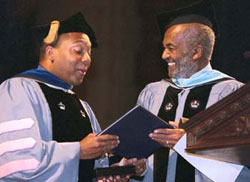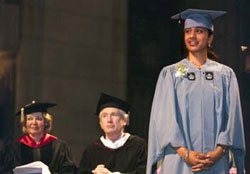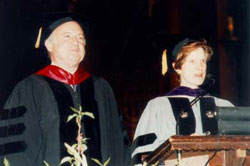TC Graduates Celebrate at Master's and Doctoral Convocation Ceremonies
People craned their necks and clutched cameras when the "Prelude and Fugue in C Major" began on the great organ of the Cathedral of St. John the Divine. They were waiting to see the smiling face of a friend or family member beneath one of the 1,500 blue-gray mortarboard hats as the TC master's degree candidates marched into the Cathedral.
When all the soon-to-be graduates were seated, President Arthur Levine welcomed everyone to this occasion of joy of past accomplishments and contemplation of future goals. He noted with a laugh that he overheard one of the graduates calling his father on his cellular phone to find out where in the vast Cathedral his family was sitting.
Levine spoke briefly about the three Teachers College Medalists for Distinguished Service who have made exemplary contributions to education. The medals were given to Pulitzer Prize-winningmusician Wynton Marsalis, Pulitzer Prize-winning author Frank McCourt, and Stanford University's David Jacks Professor of Education and Public Policy Milbrey McLaughlin.
To honor each medalist, the professor who acted as an escort read each citation as Interim Dean Edmund Gordon presented the medals. Before the presentation of the medals, Dean Gordon congratulated "these 1,500 young people who have decided to devote their lives to one of the noblest professions-education."
Joan Jeffri, Program Coordinator from the Department of Arts and Administration, introduced Marsalis, noting his commitment to restoring jazz music to its prominent place in American life, especially in education. "People are reaching out to touch you and talk to you," said Jeffri. "What you have created is as extraordinary as yourself."
Marsalis co-founded the internationally recognized Jazz at Lincoln Center program where he serves as Artistic Director. One of the most successful aspects of the program has been his Saturday "Jazz for Young People" series. Marsalis also brings his message about the values that jazz embodies to a new generation through his television specials and National Public Radio series, "Making the Music."
He advised the graduates to savor the moment of graduation and to remember it. "When you are surrounded by what is worse than you think in a classroom, you will realize and understand the differences you can make," said Marsalis in his remarks. "You have to make it sweet."
Professor Ruth Vinz, who was recently promoted to full professor, introduced McCourt and thanked him for sharing his storytelling gift with the world. "You write of life experiences that help us to pin down our own dreams-almost," Vinz said. "Memory isn't always sweet, but it's powerful and filled with surprise and whimsy."
McCourt, Pulitzer Prize-winning author of Angela's Ashes, turned his love of reading into a career of teaching. His first professor at New York University was TC's beloved Professor Emeritus Maxine Greene.
"I was the least of her students because I didn't have a high school diploma-I went through NYU in a sort of apology," said McCourt who sat next to Greene at the Medalist Dinner the night before, which honored all of the TC Medalists. "I was enthralled because she told me a story. She told me stories of education in America and that committed me to a career in teaching."
He began his career in teaching at a vocational high school on Staten Island, eventually teaching at the prestigious Stuyvesant High School in Manhattan.
"Every day that I was teaching, I was learning," said McCourt in an Irish brogue. "Thirty years later, on my last day of teaching, I was able to look back and say, 'I'm glad that I did that, that was good and I hope I was of some use.'"
Professor Jeanne Brooks-Gunn introduced McLaughlin noting her dedication to conducting vital research on public education focusing on the needs of urban and rural youth who are considered to be at risk. Her research, funded by the Spencer Foundation, looks at what community-based resources are available for young people as well as what these opportunities represent for learning and positive development. She also is the Director of the John Gardner Center for Youth and their Communities, a partnership between Stanford University and Bay Area Communities.
"Learning is an essential ingredient in the social process," said McLaughlin whose work focuses on the role of the community in helping education. "This work-my lifelong commitment and passion-is what Teachers College is all about."
After all the medals were presented, Levine came to the podium. Several faculty members who collectively spent 145 years at TC are retiring this year, he said. They are Professors Dale Mann, Clifford Hill, Mordecai Rubin, Ursula Kirk and Frank Smith. Levine also thanked Dinny Morse who is retiring after three years as Co-Chair of the Board of Trustees. He gave special thanks to Interim Dean Gordon, "who took one year out of his retirement to help TC."
After the medals were presented, the student speaker, Swati Arvid Shah, who earned her master's degree from the Department of Curriculum and Teaching, completed the ceremonial speeches. Her words to her fellow graduates took the form of a new type of research study, "Research and Reflection: A Different Look at Our Journey."
"My fellow peers, today marks the culmination of our research papers, but today also marks the commencement of our greatest studies," Shah concluded. "I hope that you not only feel you can do, but you continue to do. I came to Teachers College to know more, to be more and now I leave with the energy to do more."
Years of work and tens of thousands of pages of writing culminated the next day at Riverside Church for another group of TC graduates. At the doctoral ceremony, 176 graduates received their doctoral hoods.
Before the graduates lined up for the ceremony, Levine introduced this year's Dodge Medalist Richard Robinson, CEO of Scholastic, Inc. The Dodge medal is given to someone whose work is not in the field of education, but who has improved education in some significant way.
Robinson, a former high school English teacher, took over Scholastic Inc. in 1974 from his father, Maurice, who started it in 1920. He has led the company in television production, film and video programming and the creation of Scholastic software.
In his remarks, Robinson said this medal is especially significant because he attended memorable classes 40 years ago at TC. After thanking his colleagues at Scholastic, he said that 50 percent of this honor goes to Harry Potter who has made literature exciting for both kids and adults.
Reading-which lets children explore the inner worlds of imagination-is the key to Robinson's vision for the future of education. All children must read and master the tools of technology in order to be successful, he said. In addition, teachers, parents, librarians, safer schools and professional development can help kids to read better, said Robinson.
"It's the wizards of words, like J.K. Rowling, who create the vision that beckon children to the wonderful world of reading," Robinson said.
After Antonia Grumbach, Co-Chair of the Board of Trustees, presented Robinson with his medal, Professor Clifford Hill made a special announcement about International and Transcultural Studies doctoral student Tess Magsaysay who passed away after a brave fight with cancer. Hill spoke of Magsaysay's work on language and poetry and her contributions to academic research at TC.
Before the ceremony ended students were recognized by their department chairperson and presented with their doctoral hoods by the Dean. Armed with video cameras, the audience watched excitedly as the students were hooded.
"It's been long, but it's been fun," said Interim Dean Gordon at the end of the ceremony. "We now recognize these graduates as scholarly colleagues who will teach what they know as well as know how to ask questions."
Published Sunday, May. 19, 2002


